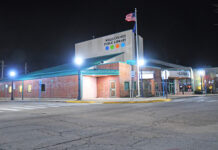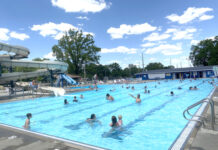By JONATHAN SNYDER
Last month, the Regional Sewer District collected over $5,000 less than it billed.
Since then, RSD attorney Mark Burry reported that another $4,000 in delinquent payments were received. Burry acknowledged that the uncollected numbers can look worse or better depending on when the report is made, but still keeps an eye on any delinquent payments.
Burry, RSD Superintendent Lewis Brown and RSD board member Andy Stoller stated that the only source of revenue for the RSD comes through the utility charges, which cover the treatment costs paid to the city, operation and maintenance cost of the sewer line, employee costs and paying off the SRF.
Burry also noted that once someone is 90 days behind on payment, the district has to file a lien on the property. Similar to how utility charges for sewer and electricity work in Bluffton, if those payments are left unchecked the city still has the right to file against real estate owners.
Stoller stated that the $95 rate was established through a third party that determined the RSD’s operational budget. However, some customers pay a $35 interim rate before receiving service.
Stoller stated that as soon as an RSD project breaks ground, they need to have a mechanism in place to start paying off the loan, which is where the interim rate comes from.
Additionally, the rate increases to $95 on the expected completion date, not the project’s actual completion.
SRF loans require that the RSD put an estimated completion date on the project for the loan to be accepted. Brown believes that those estimates figure into how Baker Tilly does the rate assessments and figures the minimum cost to cover the RSD’s expenses. Stoller also noted that the interim rate is designed to cover the debt payments until the line is fully operational to minimize the impact.
Ultimately, this means that a portion of billed customers may not receive service.
Due to construction delays with the Craigville project, in particular, the project was not completed before the estimated date, and people were charged the full $95 per month. Brown stated that people were “rightfully” upset, but the RSD was stuck in that moment.
“If we would delay that $95 payment by even two months, that’s going to affect the rate,” Brown said. “So that’s why we have to stick to that (date).”
Brown clarified that the RSD covers the installation of the main lines and grinder stations for homeowners, but the installation of a connecting pipe from the house itself to the main sewer line must be covered by the homeowner. The RSD has a list of contractors who are willing to do the equipment, but the costs for that and any potential yard recovery work must be covered by the homeowner. Brown stated that this is due to the unreliability of getting utility easements for every home under the RSD.
While the RSD acknowledged frustrations with the payment structure and early growing pains of their projects, they also stated that things have been refined and are going more smoothly as time goes on.
“I know it costs money for them, but it is a positive thing,” Brown stated. “There are new houses that are going up and we will continue to get new houses.”
jonathan@news-banner.com



